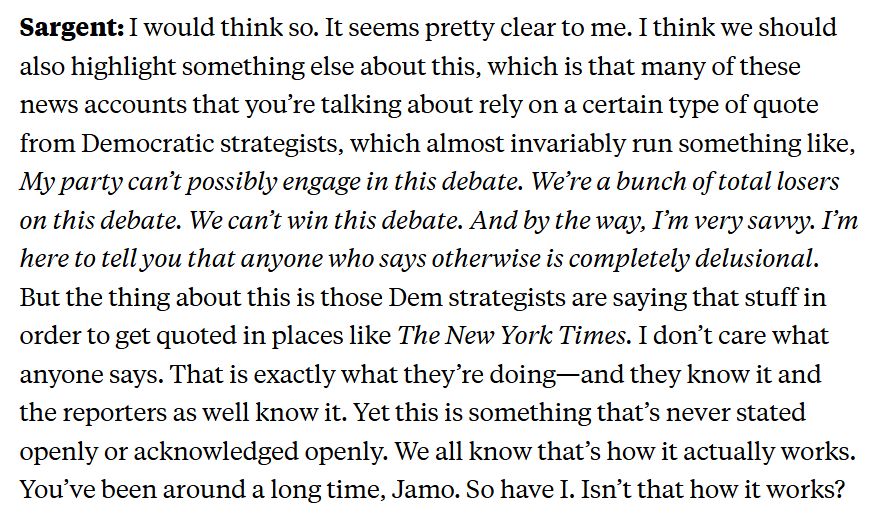From the top rope
05.11.2025 22:24 — 👍 4742 🔁 1236 💬 102 📌 416Meringuetan
@meringuetan.bsky.social
Eric Haskell
@meringuetan.bsky.social
Eric Haskell
From the top rope
05.11.2025 22:24 — 👍 4742 🔁 1236 💬 102 📌 416


Here's some real talk: Dem strategists urging Dems to avoid the "trap" of talking about Trump occupying cities are saying this precisely in order to get quoted in NYT and elsewhere, and everyone involved in this charade knows it.
@jamisonfoser.bsky.social and me:
newrepublic.com/article/1998...
I nominate @johngreensbluesky.bsky.social
07.05.2025 01:56 — 👍 2 🔁 0 💬 0 📌 0I'm sure Russia has
07.05.2025 00:59 — 👍 0 🔁 0 💬 0 📌 0
Law Firms Made Deals With Trump. Now He Wants More From Them.
Brad Karp must go down as one of the villains of this era, a man who enabled and encouraged this lawless power grab because he ignored his commitment to the law in an attempt to make things go more smoothly for him and his buddies.
16.04.2025 15:09 — 👍 593 🔁 99 💬 29 📌 5
Great news everyone it was so much more FUCKING STUPID than it may at first appear
www.cnn.com/2025/02/14/c...

To this end, Hugenberg practiced what he called Katastrophenpolitk, “the politics of catastrophe,” by which he sought to polarize public opinion and the political parties with incendiary news stories, some of them Fabrikationen—entirely fabricated articles intended to cause confusion and outrage. According to one such story, the government was enslaving German teenagers and selling them to its allies in order to service its war debt. Hugenberg calculated that by hollowing out the political center, political consensus would become impossible and the democratic system would collapse. As a right-wing delegate to the Reichstag, Hugenberg proposed a “freedom law” that called for the liberation of the German people from the shackles of democracy and from the onerous provisions of the Versailles Treaty. The law called for the treaty signatories to be tried and hanged for treason, along with government officials involved with implementing the treaty provisions. The French ambassador in Berlin called Hugenberg “one of the most evil geniuses of Germany.” Though both Hitler and Hugenberg were fiercely anti-Communist, antidemocratic, anti-immigrant, and anti-Semitic, their attempts at political partnership failed spectacularly and repeatedly. The problem lay not in ideological differences but in the similarity of their temperaments and their competing political aspirations. Like Hitler, Hugenberg was inflexible, stubborn, and self-righteous. When challenged, he doubled down. Hugenberg had spoken of a “third Reich” as early as 1919, well before Hitler was a force on the political scene, and he envisioned himself as the future Reichsverweser, or “regent of the Reich.” His followers greeted him with “Heil Hugenberg!” Joseph Goebbels noted that Hitler invariably emerged from his meetings with Hugenberg red-faced and “mad as shit.”

After cantankerous negotiation, a deal was reached: Hugenberg would deliver Hitler the chancellorship, in exchange for Hugenberg being given a cabinet post as head of a Superministerium that subsumed the ministries of economics, agriculture, and nutrition. Once in the cabinet, Hugenberg didn’t hesitate to meddle in foreign relations when it suited him. Reinhold Quaatz, a close Hugenberg associate, distilled Hugenberg’s calculus as follows: “Hitler will sit in the saddle but Hugenberg holds the whip.” The New York Times expressed astonishment that Hugenberg, an “arch-capitalist” who stood “in strongest discord with economic doctrines of the Nazi movement,” was suddenly in charge of the country’s finances. Hitler’s “socialist mask” had fallen, the Communist daily Red Banner proclaimed, arguing that “Hugenberg is in charge, not Hitler!” The weekly journal Die Weltbühne dubbed the new government “Hitler, Hugenberg & Co.” As self-proclaimed “economic dictator,” Hugenberg kept pace with Hitler in outraging political opponents and much of the public. He purged ministries. He dismantled workers’ rights. He lowered the wages of his own employees by 10 percent. “The real battle against unemployment lies singularly and alone in reestablishing profitability in economic life,” one of Hugenberg’s newspapers editorialized, arguing that the goal of economic policy should be to rescue “the professions, and those most negatively affected: the merchant middle class.” Hugenberg declared a temporary moratorium on foreclosures, canceled debts, and placed tariffs on several widely produced agricultural goods, violating trade agreements and inflating the cost of living. “It just won’t do,” Hitler objected in one cabinet meeting, “that the financial burdens of these rescue measures fall only on the poorest.” Let them suffer awhile, Hugenberg argued. “Then it will be possible to even out the hardships.” The economy fell into chaos. T

In late June 1933, while Hitler was trying to assuage international concerns about the long-term intentions of his government, Hugenberg appeared in London at an international conference on economic development. To the surprise of everyone, including the other German-delegation members present, Hugenberg laid out an ambitious plan for economic growth through territorial expansion. “The first step would consist of Germany reclaiming its colonies in Africa,” Hugenberg explained. “The second would be that the ‘people without space’”—Volk ohne Raum—“would open areas in which our productive race would create living space.” The announcement made headlines around the world. “Reich Asks for Return of African Lands at London Parley,” read one New York Times headline. Below that, a subhead continued: “Also seeks other territory, presumably in Europe.” From the March 1932 issue: Hitler and Hitlerism: a man of destiny Konstantin von Neurath, Hitler’s foreign minister, tried to walk back the Hugenberg statement, asserting that Hugenberg had expressed only a personal opinion, not government policy. Hugenberg dug in his heels, retorting that, as economic minister, when he said something, he was speaking for the entire government. Foreign policy was just an extension of economic policy. Confusion and embarrassment followed.

By then Hitler no longer needed either Hugenberg’s corporate contacts or his Reichstag delegates. The bankers and industrialists who had once shunned the crass, divisive, right-wing extremist had gradually come to embrace him as a bulwark against the pro-union Social Democrats and the virulently anti-capitalist Communists. Six months earlier, three weeks before Hitler’s appointment as chancellor, the banker Kurt Baron von Schröder had met with Hitler at Schröder’s villa in a fashionable quarter of Cologne. The arrangements were cloak-and-dagger: Hitler made an unscheduled, early-morning exit from a train in Bonn, entered a hotel, ate a quick breakfast, then departed in a waiting car with curtained rear windows to be driven to the Schröder villa while a decoy vehicle drove in the opposite direction. Hitler walked out of the meeting with a 30 million reichsmark credit line that saved his political movement from bankruptcy.
"The Oligarchs Who Came to Regret Supporting Hitler
They helped him in pursuit of profit. Many ended up in concentration camps."
By Timothy W. Ryback
these excerpts could have a few names and places changed and be printed today
www.theatlantic.com/ideas/archiv...

New York City Hall
#50501
What would John Lewis do?
04.02.2025 23:07 — 👍 0 🔁 0 💬 0 📌 0Call the Capitol Police!
04.02.2025 02:29 — 👍 3 🔁 0 💬 1 📌 0Thanks Mark!
24.12.2024 21:34 — 👍 1 🔁 0 💬 0 📌 0I think Boone was a terrible hire -- and that itself was a part of a misguided attempt to embrace analytic by a guy who doesn't get it, i.e., Cashman
23.09.2023 04:14 — 👍 1 🔁 0 💬 1 📌 0
Boone Too!
Funny you should ask 😉
23.09.2023 04:09 — 👍 1 🔁 0 💬 1 📌 0
Cash Out!
Fire Brian Cashman night at Yankee Stadium!
#yankees #mlb
We just need the ability to down vote to get the best parts of the Reddit system
21.09.2023 03:25 — 👍 1 🔁 0 💬 0 📌 0
Aaron Boone already ejected in the second inning #yankees #mlb
20.09.2023 23:46 — 👍 9 🔁 1 💬 1 📌 1